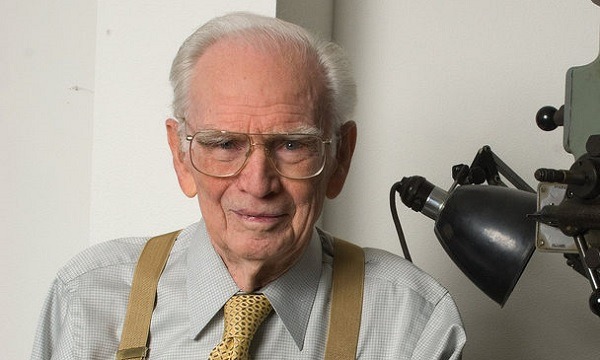Wayne Everett Quinton, known as the “father of bioengineering” at the University of Washington, passed away on January 22 at the age of 94. Quinton was known for his ability to work collaboratively with engineers and clinicians, becoming one of the first practitioners of bioengineering and serving an integral role in forming UW’s Center for Bioengineering, which became what is now the Department of Bioengineering. Quinton’s legacy and impact upon the field was recognized in a February 4 obituary in The Seattle Times.
Quinton is a 2009 recipient of UW’s Diamond Award for Entrepreneurship and was also honored with UW’s highest honor for a graduate — the Alumnus Summa Laude Dignatus award.
Quinton joined UW in 1949, where he initially worked as an electronics technician developing heat-measuring equipment for an Arctic acclimatization study. Two years later, he accepted a job leading the new instrument shop for UW’s medical school. In this role, Quinton’s “raw curiosity” and ability to “speak physician” helped him establish productive cross-disciplinary relationships. “I never tried to say I knew something I didn’t. And I think because I kept asking the question ‘Why?,’ I taught them a little about engineering and they taught me a little about medicine,” Quinton said of his experience working with clinicians in a 2009 UW alumni magazine interview.
Quinton’s success in bridging the gap between engineering and medicine led to significant innovation in medical devices and his recognition as one of the nation’s “25 Top Young Scientists.” by Life magazine in 1950. His inventions include a bubble oxygenator that enabled physicians to perform the first open-heart surgery in the Pacific Northwest, a shunt that allowed kidney disease patients to be easily connected to dialysis machines and a lightweight treadmill that is now ubiquitous for its use in cardiac stress testing.
Outside of his job, Quinton pursued a Bachelor of Science degree in mechanical engineering, which he completed in 1959. However, friends and colleagues of Quinton’s said that his degree wasn’t necessarily an important factor in his success as a bioengineer. “The important thing was that (engineering) was in his soul,” said Buddy Ratner, UW professor of bioengineering and chemical engineering.
After earning his degree, Quinton left UW to establish his company, Quinton Instruments. The company, which he sold in 1984, is one of the oldest medical device companies in the region and contributed significantly to the growth of Seattle’s now-robust biotechnology sector.



